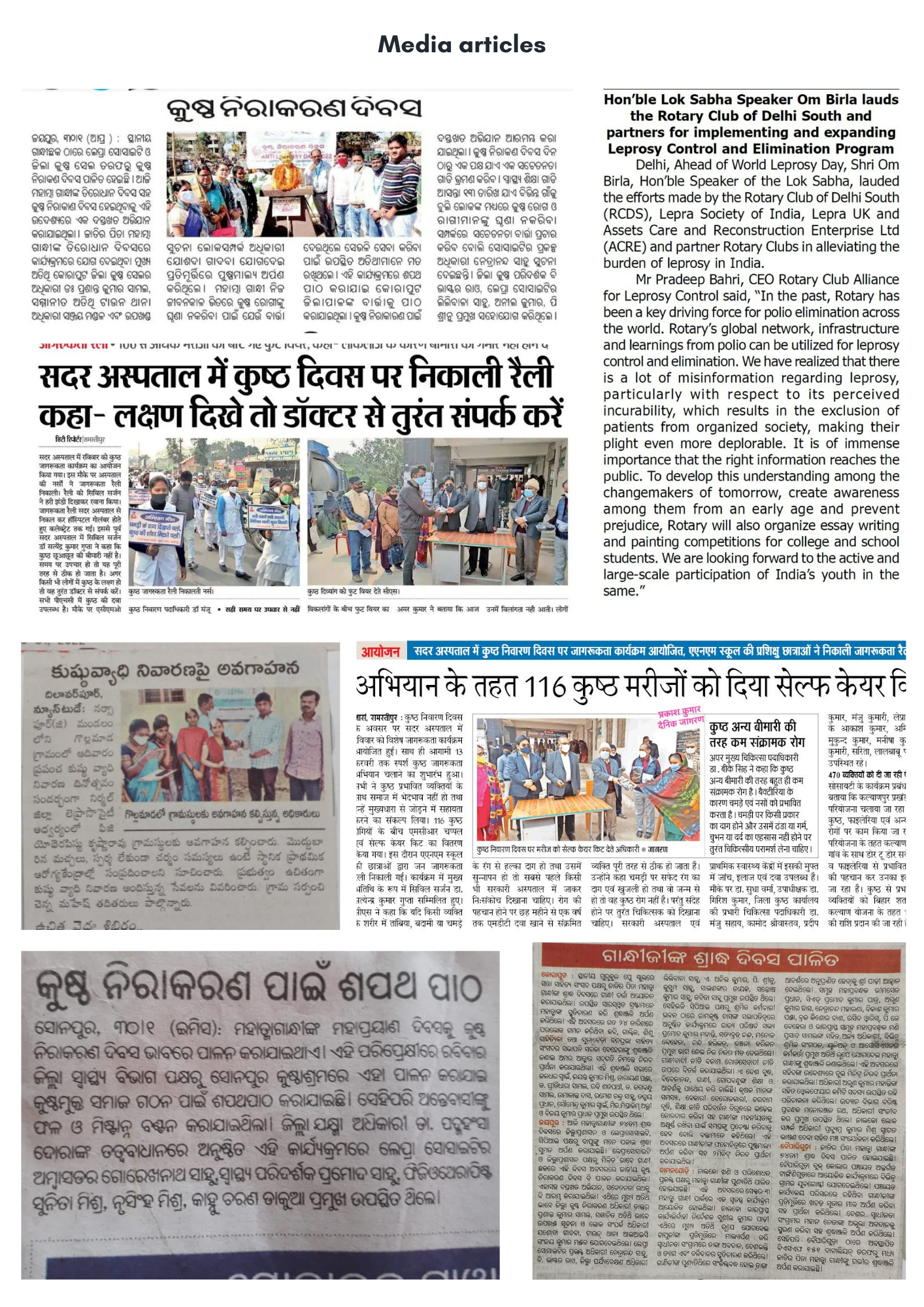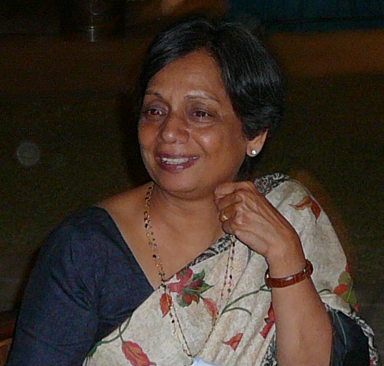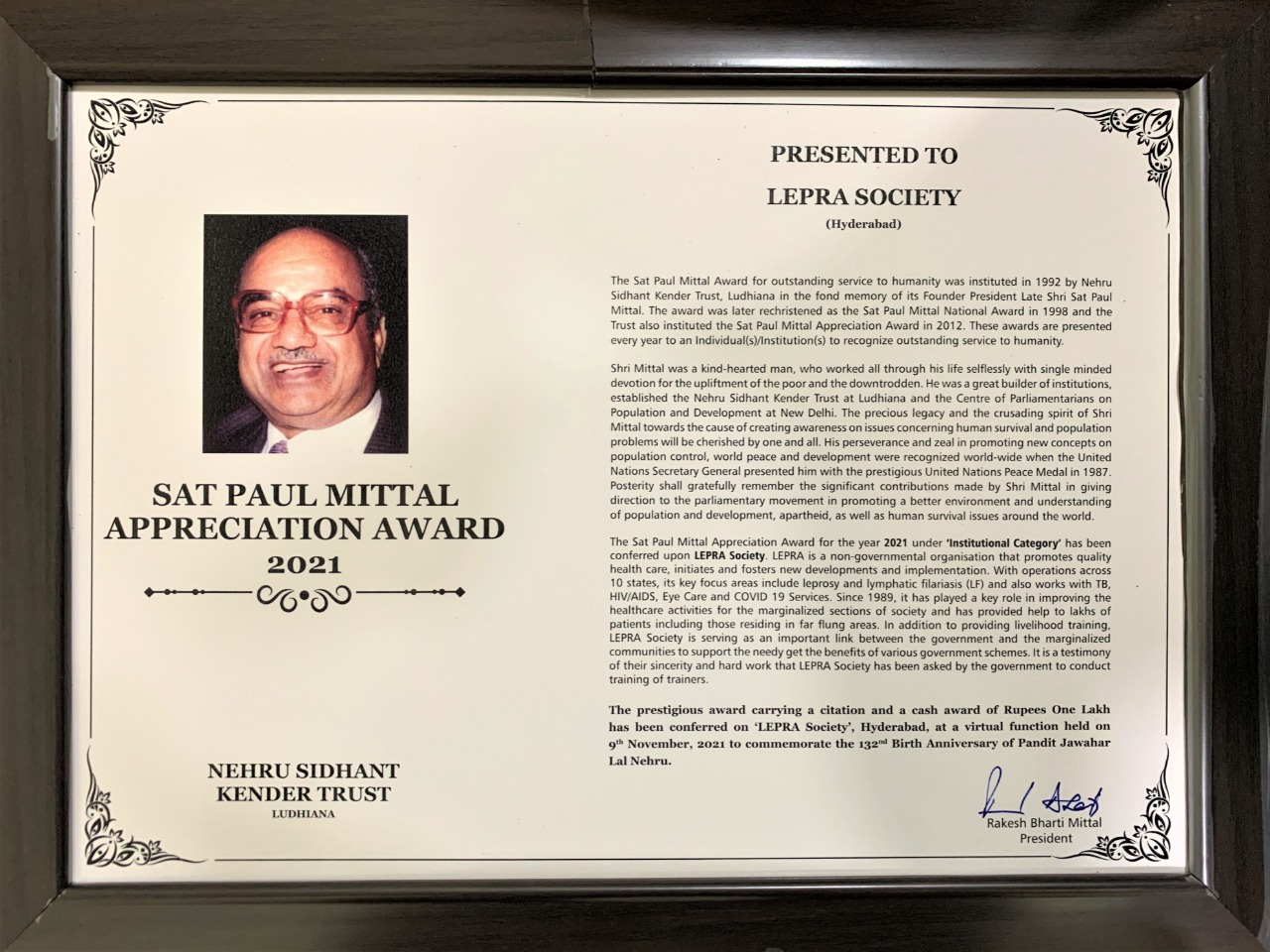On the 22nd of February, 2024, LEPRA India celebrated recipients of the inaugural K.V. Desikan Memorial Award. This year, the award was jointly given to Drs. Anurag and Madhavi Bhargava from Yenepoya Medical College, Mangalore; and to the Bombay Leprosy Project, for their outstanding and inspring work on tuberculosis and leprosy, respectively.
The K.V. Desikan Memorial Award recognizes individuals and/or organisations who have made significant contributions in the field of infectious diseases, in community health/ development/rehabilitation and/or the laboratory sciences.
Drs. Anurag and Madhavi Bhargava received the 2024 award for their distinctive and dedicated work in the area of malnutrition, tuberculosis and public health. They co-lead the Center for Nutrition Studies at Yenepoya (Deemed to be University) in Mangaluru, and prior to that, worked for ten years at Jan Swasthya Sahayog (JSS) in rural Bilaspur, Chhattisgarh. Their decision to move to a remote, underserved, tribal area to help start JSS, and their long-standing work in community health demonstrates their commitment to social justice, equity and health care in rural India. Witnesses to extreme hunger, under-nutrition, and rampant tuberculosis in rural populations, they designed, and successfully completed, the landmark RATIONS trial, published in The Lancet in 2023. The trial decisively demonstrated the impact of food supplementation on reducing deaths among people with tuberculosis, and on reducing the risk of tuberculosis among household members.
The Bombay Leprosy Project also received the 2024 award, for its extraordinary body of work in the area of control, treatment and rehabilitation of leprosy. Founded in 1976, the Bombay Leprosy Project has shown unwavering commitment to care and prevention of disability among persons affected with leprosy in urban areas of Mumbai and adjoining rural areas of Thane district. The project has carried out remarkable case detection work through Information, Education, Communication (IEC) campaigns and special drives in slum pockets and schools. Demonstrating long standing dedication, the Bombay Leprosy Project has propagated and practiced integration of persons with leprosy in society. Comprehensive training and vocational guidance as well as rehabilitation programmes for persons cured of leprosy has facilitated self reliance.
About the Award
Instituted by LEPRA in the year 2023, the K.V. Desikan Memorial Award recognizes individuals and/or organisations who have made significant contributions in the field of infectious diseases, in community health/ development/rehabilitation and/or the laboratory sciences. Dr K.V. Desikan, formerly Director of the Central JALMA Institute for Leprosy, Agra, and subsequently, Chairman of LEPRA India, was a legend in the field of leprosy. He passed away on 23rd October, 2022, at the age of 96. His work encompassed the entire spectrum of leprosy: descriptive epidemiology, diagnostics, histopathology, immunology, physiology, therapy and simple clinical observations; and is acknowledged with the respect that it deserves.

23 November 2021
In an interview for Science Reporter magazine in 2016, Professor Indira Nath described the moment she ‘felt the calling’ to medical research, at the mere age of only ten years old. Even then, she knew that she wanted to make a long-lasting impact rather than a transient one. Having this clarity at such a young age is incredibly rare and this shows how remarkable she was.
“I realised, pretty early on, that even I live to be a hundred, and treat patients, how many people would I make a difference to? Whereas I felt, if I did research then perhaps I could make a bigger impact”.
As an undergraduate, Prof. Nath regularly accompanied her pharmacology tutor to a leprosy community on the river Yamuna, near Delhi, where they worked in their own time to provide treatment and care for the people affected. It was here Prof. Nath discovered the injustice and prejudice surrounding leprosy, which she saw as a greater, more fundamental issue than the physical aspects of the disease itself. This prejudice extended to the medical profession, with a historical neglect of meaningful research into this ancient disease, it is no surprise that Prof. Nath was driven to dedicate her working life to the cause of leprosy research.
Prof. Indira Nath (born 14th Jan 1938) was a noted immunologist and a world-renowned leprologist. She got her medical research degree and doctorate from the ‘All India Institute Of Medical Science’ (AIIMS), New Delhi, in 1970. She then went to the UK with a Nuffield Foundation Fellowship and worked in the National Institute of Medical Research in London. Here she specialised in infectious diseases, with a focus on Leprosy. She returned to India to join Prof. GP Talwar’s Department of Biochemistry at AIIMS and later went on to establish the Department of Biotechnology in 1986.
Her association with Lepra began during her time with the Nuffield Foundation, while in the UK, an association which continued for the rest of her life. From the year 2000, she was on the research advisory board of Lepra and worked as the Director of Lepra’s research centre, the ‘Blue Peter Research Centre’ (BPRC) during 2006 – 2009. During her association with Lepra, she was instrumental in the initiation of several research programmes, focussed on a greater understanding of leprosy. Some of the research interventions include projects on antimicrobial resistance, peripheral nerve imaging and immunopathogenic studies to help understand the nerve damage caused by leprosy.
Her work and contribution in understanding Leprosy has been profound and her colleagues and peers will surely feel the immense vacuum her departure has left.
Dr. Vishwa Mohan Katoch; Chairman of LEPRA Society and also the Chair of the National Academy of Sciences, India (NASI), Indian Council of Medical Research (ICMR), Rajasthan University of Health Sciences (RUHS) in Jaipur, had worked with Prof. Nath since 1978. Dr Katoch remembers Prof. Nath with great respect and fondness:
“Right from late 1970s onwards we all saw her as a scientist who was in pursuit of originality and impact making science. Her entire work on immunology of leprosy and viability of leprosy bacillus is a testimony of her original contributions to science. Along with her work as medical teacher and scientist she was growing as administrator and science manager. Establishing a department of biotechnology in the best medical institution – AIIMS was a landmark. This department has made significant contributions in basic and translational aspects of several diseases including tuberculosis, malaria and leprosy.”
Geoff Prescott, CEO of Lepra, acknowledged her contribution towards building impactful research programmes in Lepra, UK said:
“Everyone in Lepra in India, Bangladesh and the UK is saddened by this news and wishes to express our sincere condolences to Professor Nath’s family, colleagues and friends. Professor Nath will be remembered by Lepra and many others for her outstanding contributions to the field of leprosy. She truly made the world a better place and will be much missed.”
Similarly, Prasant Naik, CEO of LEPRA Society, India said:
“We are lucky to have been associated and guided by Prof. Nath. Her love of research and her passion for working in field of Leprosy helped in better understanding the disease. We pray to the Almighty to give strength to her family members, friends and all staff of LEPRA to overcome this immense loss.”
Her illustrious career was marked by many recognitions. She was elected Fellow of the National Academy of Sciences, India, Allahabad (1988), Indian Academy of Sciences, Bangalore (1990), Indian National Science Academy (INSA; 1992), National Academy of Medical Sciences (India) (1992), Royal College of Pathology (1992) and the Academy of Sciences for the Developing World (TWAS) (1995). She was Member, Scientific Advisory Committee to Cabinet, Foreign Secretary INSA (1995–97), Council Member (1992–94, 1998-2006) and Vice President (2001–03) of the National Academy of Sciences (India), Allahabad, and Chairperson, Women Scientists Programme, Department of Science and technology, India (2003).2
She was also awarded the Padma Shri by Government of India in 1999, and L’Oréal-UNESCO Awards for Women in Science in 2002 in addition to several other awards.
In spite of being so successful, she was humble and approachable. When asked which award she values the most, she said:
“The only award that I wanted to have was the Bhatnagar Prize. Getting the Bhatnagar Prize somehow made me come across other sciences and other scientists and that’s been enormously helpful in the way I looked at the problem, so that was a tremendous boost.”
This demonstrates Professor Nath’s life-long commitment to learning and the advancement of medical research. She remained a true student of science and research throughout her life.
While Prof Nath’s loss is irreplaceable, the lessons we can learn from her life and career are many. We at Lepra willtake forward her teachings and her example to continue the fight to beat leprosy. We will always have Prof. Nath guiding us along the way.
Sources
1. http://nopr.niscair.res.in/bitstream/123456789/34339/1/SR%2053%286%29%2048-50.pdf
2. https://en.wikipedia.org/wiki/Indira_Nath
3. Obituaries from Dr. Katoch, Geoff and Prasant.

